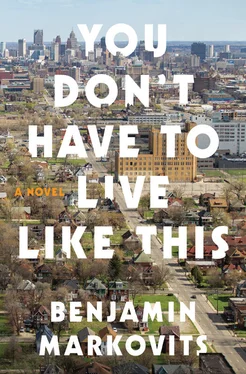Eventually a side door opened, and a guy came out.
“What the fuck you doing?” he said. He was black and about six foot three and maybe fifty pounds overweight.
“Just fucking around,” Steve said.
“Well, go fuck around somewhere else.”
“How come they make you work Sundays?”
“Because of assholes like you.”
The car window was rolled down so I could hear all this. The guy had a Triton Security cap on, loose blue jeans and big white brand-new sneakers.
“What’s the plan for this building anyway? They gonna fix it up?”
“Look. I get paid to sit here so I sit here.”
“Is there something inside? I just want to see.”
“I’m gonna go back in now. If you’re still standing there when I sit down, I’m calling the police.”
Steve walked to the car and got in. “Let’s just sit here. He’s not going to call the police.”
“What the fuck are you doing?”
“I bet he won’t,” Steve said, but he turned on the ignition anyway and backed out.
On the way home, he explained himself. Neil sometimes woke up very early in the morning, as early as four a.m., and to get him back to sleep Steve put him in the car and just cruised. A couple of weekends ago he drove past this place — another Sunday morning, predawn. The gates were open and there was a container truck backing in. So he hung around to watch them unload.
“So what was it?” I said.
“Aluminum. I’m almost certain. There were wooden shelves and bins, which is what they usually store aluminum in, to prevent scratching. But I couldn’t see anything else.”
“I don’t understand.”
“The price of aluminum has gone up almost two hundred percent in the past year. Partly because of new technologies. But it’s also one of those commodities people buy up in a recession. So I started looking around for storage depots — empty office buildings, factories, warehouses, that kind of thing. I don’t need to tell you how many there are. You think the police presence is for us? Somebody’s buying up aluminum, and they’ve done a deal with Robert James to store it. After all, that’s what Detroit is good for, cheap real estate. And it’s all going in — nothing’s coming out. They’re driving up prices. We’re just the window dressing here, what’s really going on is big business.”
I couldn’t tell anymore how crazy he was. Indications from various quarters suggested that my view of reality was pretty limited.
LATER THAT WEEK I DROVE to Linwood Street to fire a few rounds with Mel Hauser. We had lunch first in the canteen and I heard a lot of cop gossip. Nobody had much sympathy for Dwayne Meacher.
“Look,” one of them said to me. “There’s no case there. You steal somebody’s phone, you’re on a bike, you’re trying to get away. Then you get hit by a car. If the kid isn’t black, believe me, none of this is even an issue.”
He had a good head of gray hair and a spongy old-guy’s face. His nose was bulbous; he had trouble getting food out of his teeth. I had my first Coney that day, a hot dog covered in chili, which tasted like it sounds.
“What do you think?” Mel said.
“It’s school-lunch food.”
“This isn’t a particularly good example.”
“The civil suit is more baloney,” the guy went on. “Michigan has a no-fault law, which basically means, since the kid didn’t have insurance, the driver’s insurance has to pay damages. It doesn’t matter whose fault it was — that’s what no fault means. Everything else is just a publicity stunt.”
“But the kid is black,” I said. “So it is an issue.”
“You’re the guy who lives around there. As far as I’m concerned that’s looking for trouble. When they burn down your house I’ll say the same thing. You asked for it.”
“Do you think they’ll bring charges against Tyler Waites?”
“Is Larry Oh up for reelection?”
Mel’s old buddies were all white. But I liked them; they liked to piss each other off in a friendly way. I asked Mel how his kids were and one of them said, “What does he know?” A few of the other guys had retired, too. They didn’t talk as much as the rest, they seemed happy to be there, they went up for seconds. Mel didn’t talk much either.
Afterwards, on the way to the range, I asked him why it took three minutes for the cops to arrive and twenty-three minutes before an ambulance showed up.
“How do I know?” he said. “There was probably a car on patrol.”
There were five or six guys ahead of us, but the duty officer brought out a couple of Smith & Wessons and Mel took me through the process of cleaning them. Since the weather was fine, we went to the outdoor range, which looked like a parking lot surrounded by concrete walls. But over the walls you could see trees, already summery with leaves, blowing back and forth. The clouds in the sky got pushed along at a good clip, but it wasn’t cold. Pop pop pop —the background noise was full of gunshots, but the open air made everything sound a little farther away.
“So you don’t think it was a racial thing?”
“This is Detroit,” Mel said. “Nothing works. We don’t have enough ambulances, which is why for some parts of the city they use private companies. It’s up to the dispatch operator when you call 911. They have to make sure everybody gets to the scene on time. Police, ambulance, fire services. And let me tell you something else. Nine out of ten of the people on the phones are black.”
“What about the cop. The one who said that Tyler admitted to him he tried to hit the kid. How come they suspended him? Doesn’t that look a little like a cover-up?”
“You know why. For fucking tweeting about it. They should have fired him. Blame him if you want to blame anybody.”
“Do you know him?”
“I know guys like him. There’s a real hot dog element to these people. But he pissed on his own doorstep this time. And by the way, twenty-three minutes is par for the course. Twenty-three minutes is nothing to ask questions about.”
Shooting handguns is fun. But you need strong arms — just holding your arms out straight is heavy work, and Mel suggested I put two hands on the gun. I did okay in the beginning and managed to pepper a few in the chest area, but after that the holes started spacing out. Even with my earmuffs on I could hear the contact with the cardboard, a kind of thwuck sound after the pip of the shot.
You put one foot in front of the other. If you’re right-handed that means your left foot first.
Mel said, “Keep your eyes open. Both eyes.”
Apparently I’d been closing one of them. But it’s like I could feel different parts of my brain getting tired. After a while I started seeing double images, or silhouettes around the figure lines, and my hands and the gun waving gently in front, superimposed. When I breathed they moved; I could hear my heart in my ears. Five minutes is a long time to stare at something. We were standing in direct sunlight, and the ground was a pale gray concrete, which reflected it back. By the time we stopped I had a light sweat going.
There was a soda machine by one of the benches and Mel asked me afterwards if I wanted some pop. They had Welch’s grape. So we sat on the bench drinking and burping and watching some of the guys.
“Everybody’s fat these days,” Mel said. “When I was a kid I looked like you.”
“So what do you have to tell me about Astrid?”
“Well, you wanted me to look into it so I looked. You said they knew who his sister was so why couldn’t they find the guy. Rape is a big deal; we take rape seriously. And in this case we had a name and at least one address where the suspect was known to hang out. It didn’t make sense to me either. So I asked around a little. There were complicating factors. For one thing the guy in question had paid to get in — to the club, I mean. It was ten dollars at the door and the bouncer remembered him. He wouldn’t swear to it but he also thought they might have come out together. There’s a camera at the door, which was broken that night, but cameras inside showed Astrid dancing in the vicinity of a well-built African American male in his late twenties. The image quality isn’t good enough for a positive ID. It was pretty dark in there.”
Читать дальше












